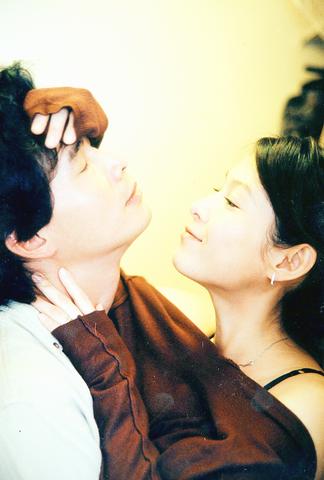Taiwanese actress Rene Liu's (劉若英) latest film to screen in Taiwan is the romantic comedy Migratory Birds (候鳥), which has been produced in cooperation with Oscar-nominated scriptwriter Wang Hui-ling (王蕙玲) and producer Hsu Li-kong (徐立功). Advance tickets are already on sale, with the inclusion of a promotional gift -- a VCD of Liu, also a talented songstress, performing the theme song. Stock is limited, so Rene Liu fans are urged to get their tickets for Migratory Birds soon.
Another associated product is the movie soundtrack, now available on CD. The theme music was written and produced by local pop band Mayday (五月天). Some of the CDs include free tickets to the film.

PHOTO: COURTESY OF ZOOM HUNT
Migratory Birds deals with the lives of Chinese immigrants living in Western cities, which has proved a recurring theme in contemporary Taiwan and Hong Kong films. Most of these films have focused on the often tragic lives and the feelings of homesickness felt by these members of the Chinese diaspora.
But on this occasion, first-time director Ding Yar-ming (丁亞民), who has made his name as a scriptwriter, presents a light and humorous look at how Taiwanese immigrants adjust to life in Vancouver, especially regarding the subjects of extra-marital affairs and sex.
Rene Liu has starred in numerous local box office success stories such as The Personals (徵婚啟事) and Fleeting by Night (夜奔). She has recently completed shooting on Double Vision (雙瞳), a big-budget production funded entirely by Columbia Asia Productions.
Liu plays a young housewife left alone with a two- year-old son in Vancouver. She is torn between two men -- her businessman husband who shuttles between Shanghai, Vancouver and Taipei, and a liberal-minded, laid-back Canadian man.
Actor Michael Teigen, who plays the role of Sean in the film, looks like a taller and slimmer Russell Crowe. He gives Liu's character a sweet memory when they dance hand in hand in the light of the beautiful sunset of Vancouver's port. Liu's husband is played by Huang Pin-yuan (黃品源) who is himself also a pop singer. His character, despite his hectic travel schedule, is not bored nor alone, meeting a girl from China on the plane from Vancouver to Shanghai.
Migratory Bird is another presentation of Hsu Li-kong and his Zoom Hunt International (縱橫國際影視), which gained recognition by producing Crouching Tiger, Hidden Dragon (臥龍藏虎). In Migratory Birds, Hsu again cooperates with his old partner, Crouching Tiger scriptwriter Wang Hui-ling, who is now living in Vancouver.
Director Ding, the writer and director of famous TV dramas such as April Rhapsody (人間四月天), is also an immigrant to Vancouver. Together they present a funny and intriguing new immigration story based upon their own observations of life in Vancouver. Pre-release tickets are available online at url:http://ticket.acer121.com
Film Notes
What: Migratory Birds (
When: July 14
Where: Taipei: Majestic, Carnival, Scholar Theaters
Tainan: Yanping Theater
Kaohsiung: Cannes Theater
Other: English subtitled screenings will be shown at 9pm every night at Majestic Theater, Taipei

Towering high above Taiwan’s capital city at 508 meters, Taipei 101 dominates the skyline. The earthquake-proof skyscraper of steel and glass has captured the imagination of professional rock climber Alex Honnold for more than a decade. Tomorrow morning, he will climb it in his signature free solo style — without ropes or protective equipment. And Netflix will broadcast it — live. The event’s announcement has drawn both excitement and trepidation, as well as some concerns over the ethical implications of attempting such a high-risk endeavor on live broadcast. Many have questioned Honnold’s desire to continues his free-solo climbs now that he’s a

Lines between cop and criminal get murky in Joe Carnahan’s The Rip, a crime thriller set across one foggy Miami night, starring Matt Damon and Ben Affleck. Damon and Affleck, of course, are so closely associated with Boston — most recently they produced the 2024 heist movie The Instigators there — that a detour to South Florida puts them, a little awkwardly, in an entirely different movie landscape. This is Miami Vice territory or Elmore Leonard Land, not Southie or The Town. In The Rip, they play Miami narcotics officers who come upon a cartel stash house that Lt. Dane Dumars (Damon)

Francis William White, an Englishman who late in the 1860s served as Commissioner of the Imperial Customs Service in Tainan, published the tale of a jaunt he took one winter in 1868: A visit to the interior of south Formosa (1870). White’s journey took him into the mountains, where he mused on the difficult terrain and the ease with which his little group could be ambushed in the crags and dense vegetation. At one point he stays at the house of a local near a stream on the border of indigenous territory: “Their matchlocks, which were kept in excellent order,

Today Taiwanese accept as legitimate government control of many aspects of land use. That legitimacy hides in plain sight the way the system of authoritarian land grabs that favored big firms in the developmentalist era has given way to a government land grab system that favors big developers in the modern democratic era. Articles 142 and 143 of the Republic of China (ROC) Constitution form the basis of that control. They incorporate the thinking of Sun Yat-sen (孫逸仙) in considering the problems of land in China. Article 143 states: “All land within the territory of the Republic of China shall